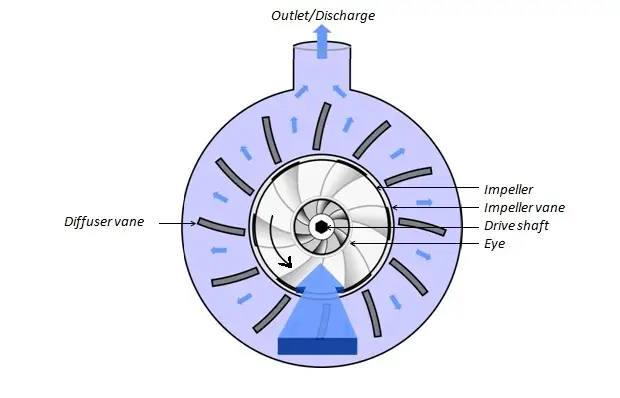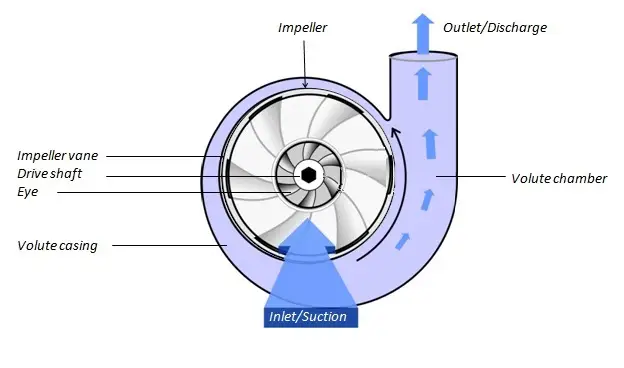Centrifugal pumps are the unsung heroes of many industries, silently working to transport fluids efficiently. Whether you’re a seasoned engineer or just someone curious about these machines, this guide is your one-stop-shop for useful information on centrifugal pumps. We’ll delve into their inner workings, maintenance, and much more. Get ready to explore the world of centrifugal pumps!
Introduction
Centrifugal pumps are a vital component in various applications, from industrial processes to household water supply systems. These devices use the principles of centrifugal force to move liquids, making them essential for countless industries. In this comprehensive guide, we’ll break down everything you need to know about centrifugal pumps, ensuring you gain a deep understanding of their operation, maintenance, and applications.
How Centrifugal Pumps Work
Centrifugal pumps operate on a simple yet effective principle. They use a rotating impeller to create a flow of fluid within the pump casing. As the impeller spins, it imparts kinetic energy to the liquid, which then gets converted into potential energy as the fluid exits the pump. This creates a continuous flow, allowing the pump to transport liquids efficiently.
Key Components of a Centrifugal Pump
To fully grasp the mechanics of centrifugal pumps, let’s explore their key components:
1. Impeller
The impeller is the heart of a centrifugal pump. Its curved blades are responsible for generating the necessary force to move the fluid.
2. Casing
The casing or housing encloses the impeller and guides the flow of the fluid. It ensures that the liquid is efficiently directed out of the pump.
3. Suction and Discharge Ports
These ports are the entry and exit points for the fluid, allowing it to flow in and out of the pump.
Types of Centrifugal Pumps
Centrifugal pumps come in various types, each designed for specific applications. Some common types include:
1. Single-Stage Centrifugal Pumps
Ideal for low-pressure applications, these pumps have a single impeller and are commonly used for domestic water supply.
2. Multi-Stage Centrifugal Pumps
Used in high-pressure systems, multi-stage pumps feature multiple impellers arranged in series to achieve higher pressure levels.
3. Submersible Centrifugal Pumps
These pumps are designed to be submerged in the fluid they’re pumping, making them suitable for applications such as groundwater extraction.
Maintaining Your Centrifugal Pump
Proper maintenance is essential to ensure the longevity and efficiency of your centrifugal pump. Here are some tips:
1. Regular Inspection
Inspect your pump regularly for leaks, unusual noises, or vibrations, which may indicate issues.
2. Lubrication
Ensure that all moving parts are properly lubricated to reduce friction and wear.
3. Cleaning
Remove any debris or obstructions in the suction strainer or impeller to maintain optimal flow.
4. Alignment
Check and adjust the alignment of the pump and motor to prevent excessive wear on components.

Useful Information on Centrifugal Pumps
In this section, we’ll provide valuable insights and tips on various aspects of centrifugal pumps, including:
1. Efficiency Matters
Centrifugal pumps are known for their efficiency. Choosing the right pump for your specific application can lead to significant energy savings.
2. Cavitation Concerns
Cavitation can damage your pump. It occurs when the liquid vaporizes due to low pressure, creating bubbles that implode, causing harm to the impeller and casing.
3. Proper Installation
Ensure that your pump is installed correctly, with proper alignment and no air leaks in the suction line.
4. Spare Parts Availability
Consider the availability of spare parts for your pump, as this can affect maintenance and repair.
Conclusion
In conclusion, centrifugal pumps are essential devices that play a crucial role in various industries and applications. Understanding how they work, their maintenance requirements, and their different types is vital for anyone working with these pumps. By following the guidelines in this comprehensive guide, you’ll be better equipped to make informed decisions regarding centrifugal pumps and ensure their efficient operation.
FAQs
Q: How do I select the right centrifugal pump for my application?
A: To choose the right pump, consider factors such as flow rate, head pressure, and the type of fluid you’re handling. Consulting with a pump expert is often a good idea.
Q: What is the lifespan of a centrifugal pump?
A: The lifespan of a centrifugal pump can vary widely depending on usage and maintenance. With proper care, they can last anywhere from 10 to 20 years or more.
Q: Can centrifugal pumps handle abrasive fluids?
A: Centrifugal pumps can handle some abrasive fluids, but for highly abrasive materials, you may need specialized pumps with wear-resistant materials.
Q: Are there energy-efficient options for centrifugal pumps?
A: Yes, there are energy-efficient centrifugal pumps designed to reduce operational costs and environmental impact. Look for pumps with high-efficiency motors and variable speed drives.
Q: How do I prevent cavitation in my centrifugal pump?
A: To prevent cavitation, ensure that the pump is correctly sized for your application, and maintain proper suction conditions by avoiding air leaks in the suction line.
Q: Can I repair a malfunctioning centrifugal pump myself?
A: It’s advisable to have pump repairs performed by trained professionals to ensure safety and optimal performance.
